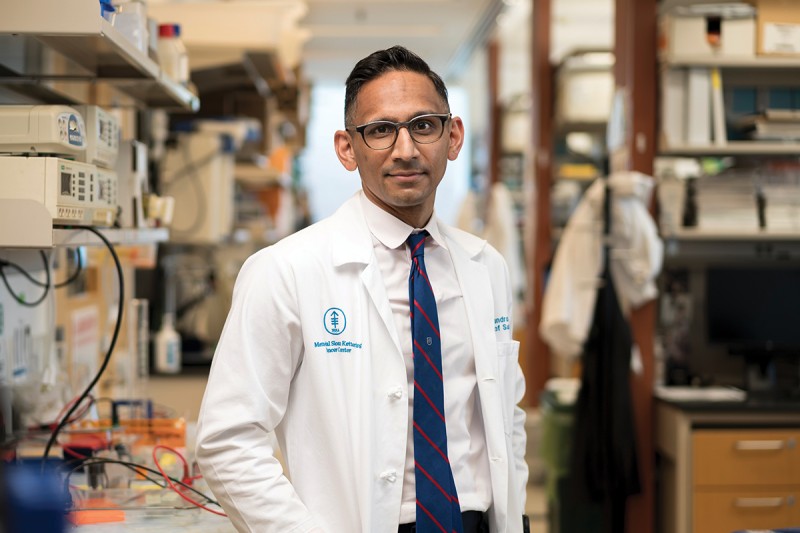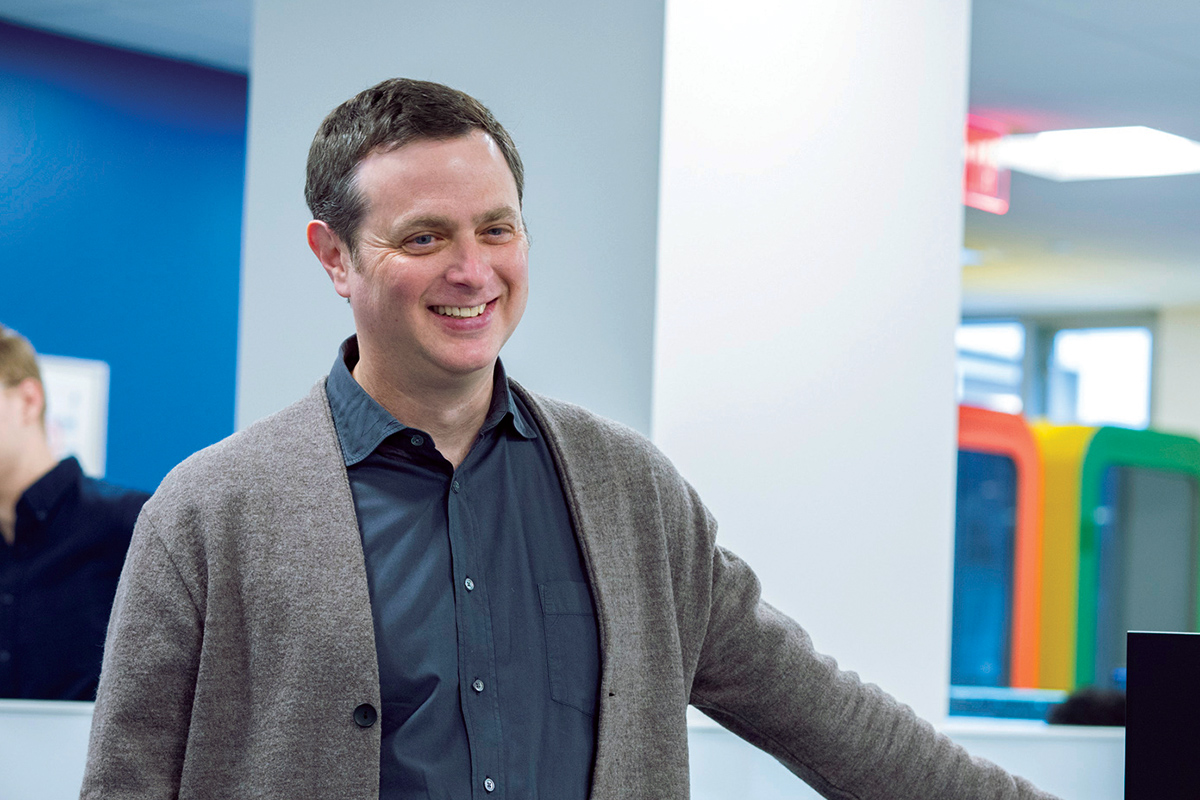
Pancreatic cancer has long been a forbidding disease. While the five-year survival rate has inched upward in recent years, it remains quite low — about 12%. But surgeon-scientist Vinod Balachandran, MD, has focused on a glimmer of hope: A small percentage of people manage to beat the odds and survive. He wondered, “What made them different?
In 2017, as reported in Nature, Dr. Balachandran’s laboratory unearthed an important clue in these rare pancreatic cancer survivors, which might help keep one of the deadliest cancers at bay.
“We have a long way to go before knowing if this will be an effective treatment,” Dr. Balachandran says. “But we’ve come this far thanks to MSK’s commitment to encouraging out-of-the-box ideas for new approaches for the most challenging cancers.”
The discoveries in 2017, supported by more evidence in Nature in 2022, uncovered the survivors’ secret: proteins in the pancreatic tumors called neoantigens that act as red flags to the immune system. Rare survivors of pancreatic cancer had immune cells called T cells that recognized these neoantigens present in their tumors and circulating in their blood — sometimes up to 12 years after their tumor was removed.
These T cells, alerted to danger, may have delayed the cancers from coming back.
“The power of the immune systems in those patients to naturally fight pancreatic cancer was amazing to see,” Dr. Balachandran says.
Based on these findings, Dr. Balachandran approached Genentech, a member of the Roche Group, and BioNTech, who had been researching and developing an individualized cancer vaccine called autogene cevumeran that targets a patient’s unique tumor neoantigens. Their vaccine uses messenger RNA (mRNA), a recipe telling the body to make proteins that bring on a protective immune response.
Genentech and BioNTech agreed to manufacture autogene cevumeran for each of the 16 patients enrolled in a Memorial Sloan Kettering Cancer Center (MSK)-led phase 1 clinical trial. It was given in combination with chemotherapy and a monoclonal antibody to patients who had surgery for pancreatic ductal adenocarcinoma, the most common form of pancreatic cancer. The trial’s primary objective was to evaluate the treatment’s safety.

The early results of the phase 1 study were encouraging. Data demonstrated a manageable safety profile, and in 8 of 16 of the patients participating, the vaccines activated T cells. The MSK team was able to track these activated T cells with the help of computational biologist Benjamin Greenbaum, PhD.
“Not only did the vaccines stimulate many of these T cells,” says Dr. Balachandran, “but we continued to detect them in patients up to three years later. These findings supported our strategy aimed at tailoring each cancer vaccine to each patient’s tumor to train the immune system to stop the cancer.”
After following patients for an average of three years after treatment, of the eight patients in whom vaccines activated T cells, six did not see their cancers return after surgery. The other two responders relapsed. Of the eight patients whose immune systems did not respond to the vaccine in the phase 1 clinical trial, seven saw their cancers return during the study period. Researchers do not yet know if the vaccine actually caused the delay in the cancer recurrence; finding out requires larger studies.
In June 2023, Genentech and BioNTech initiated a phase 2 clinical trial to evaluate autogene cevumeran in approximately 260 patients at various sites around the world, including at MSK.
Preventing — Not Just Treating — Pancreatic Cancer
MSK researchers are also looking for clues that would help arrest the disease at its earliest stage. Using cutting-edge technologies, scientists at the David M. Rubenstein Center for Pancreatic Cancer Research are zeroing in on the interaction between genetic mutations and external factors that can turn a normal pancreatic cell cancerous.
Researchers in the laboratory of computational biologist Dana Pe’er, PhD, and cancer biologist Scott Lowe, PhD, combined sophisticated genetic engineering and advanced computational methods to study the earliest cell states leading to pancreatic cancer. Using a genetically modified mouse model, they were able to mimic pancreatic cancer in humans from its earliest beginnings to when it spreads.

Their research, reported in Science, found that damage to tissue can trigger very fast changes — within 24 to 48 hours — in ways that foster cancer’s emergence and runaway growth. Inflammation from this tissue damage enhanced the cells’ ability to shed their original identity and adapt, a trait known as plasticity.
“This discovery gives a new, detailed understanding of how pancreatic cells progress to cancer when exposed to inflammation,” Dr. Lowe says. “It also provides a road map for developing strategies to detect or possibly even prevent pancreatic tumors before they reach an incurable stage.”
It’s this kind of collaborative deep dive into a disease at its most basic level that offers reasons to be optimistic — even about pancreatic cancer.
“At MSK, we have the resources and the freedom to ask the most pressing questions, and then go where the science leads,” Dr. Balachandran says. “I’ve chosen to focus not on why people don’t survive, but rather on why they live. We are learning a patient’s own immune system could be their secret weapon.”
This research receives essential philanthropy from the MSK Giving community, including, Margaret M. Keane (Dr. Balachandran); Stand Up To Cancer (Drs. Balachandran and Greenbaum); The Mark Foundation for Cancer Research (Drs. Greenbaum and Lowe); Cycle for Survival® (Drs. Lowe and Pe’er); and Break Through Cancer and the William C. and Joyce C. O’Neil Charitable Trust (Dr. Lowe).
Dr. Lowe holds the Geoffrey Beene Senior Chair and is a Howard Hughes Medical Institute Investigator.
Dr. Pe’er holds the Alan and Sandra Gerry Endowed Chair and is a Howard Hughes Medical Institute Investigator.